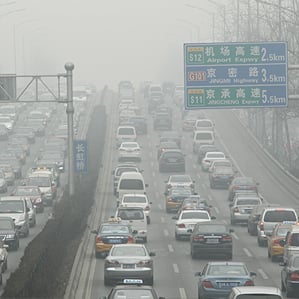Cleaning Up Diesel Trucks and Cooking Stoves Could Reduce Climate Change
Cutting our overall use of fossil fuels has proved a daunting challenge, but it might be possible to get some relief from the effects of climate change by selectively reducing the particulate pollution we produce. Recent research suggests that if we can clean up diesel engines and primitive cookstoves in India and China, for example, that could delay the effects of greenhouse-gas buildup even if pollution from coal-fired power plants persists. A study released last week concludes that if every country were to do what California has done in the last couple of decades to clean up diesel emissions, it would slow down global warming by 15 percent. Reducing similar pollution from sources such as ships and cookstoves—which weren’t included in the study—could help even more.

The study comes as governments in India and China are deciding how to address their increasing pollution, which can contribute to fatal human health problems. Over the weekend, state-controlled media in China announced new pollution rules targeting both power plants and emissions from cars and trucks.
Aerosol pollutants such as sulfur dioxide, soot, and ozone are all bad for human health, but they have different effects on the climate. “Some of the aerosols are warming the planet, and some are cooling the planet,” says Phil Rasch, a fellow at the Pacific Northwest National Laboratory in Richland, Washington. For example, sulfates that form from coal-plant exhaust reflect sunlight back into space, acting to shade the planet and cool it off. Black-carbon particles from diesel exhaust, on the other hand, absorb sunlight and heat up, warming the atmosphere.
“When you add them together, we think that on balance they’re cooling the planet,” Rasch says. That is, they mask some of the temperature increase that would have occurred as a result of carbon dioxide emissions, the main human contribution to global warming. But this effect would be more significant if the particulates that help heat up the atmosphere were removed. “If we could get rid of the ones that are warming the planet,” he says, “then that would buy us some more time.”
Rasch says that several other recent papers have asked the question posed in the one that came out this week: “What would happen if we immediately got rid of only the black-carbon aerosols?” He says doing that “might lead to a cooling of the planet by half a degree to a degree Celsius.” He notes, however, that the impact on temperature is hard to pin down. For one thing, pollution affects clouds and rainfall, which have complicated effects on climate.
One advantage of going after black carbon is that the effects would be almost immediate. These pollutants fall out of the atmosphere in the course of a few days or weeks, so once emissions stop, the air quickly clears. Carbon dioxide, on the other hand, stays in the atmosphere for hundreds of years.
Of course, it’s ultimately important to reduce all pollution, since it kills millions of people a year. “We want to cut down on pollution in every way that we can because of human health,” says Lai-yung Ruby Leung, a fellow at PNNL, who is one of the authors of the black-carbon study that came out his week. Selectively reducing pollutants as a way of countering global warming “is an important strategy we can think about,” she says, “but it needs to be carefully done.” Rasch emphasizes speeding up reduction of the pollutants that warm the planet, not necessarily putting off regulations to reduce the ones that cool it.
Leung says the research suggests at the very least that as countries clean up sulfates from power plants, they should make sure to cut down on diesel emissions at the same time. Just reducing the sulfates would cause the planet to warm up.
Keep Reading
Most Popular
Large language models can do jaw-dropping things. But nobody knows exactly why.
And that's a problem. Figuring it out is one of the biggest scientific puzzles of our time and a crucial step towards controlling more powerful future models.
The problem with plug-in hybrids? Their drivers.
Plug-in hybrids are often sold as a transition to EVs, but new data from Europe shows we’re still underestimating the emissions they produce.
Google DeepMind’s new generative model makes Super Mario–like games from scratch
Genie learns how to control games by watching hours and hours of video. It could help train next-gen robots too.
How scientists traced a mysterious covid case back to six toilets
When wastewater surveillance turns into a hunt for a single infected individual, the ethics get tricky.
Stay connected
Get the latest updates from
MIT Technology Review
Discover special offers, top stories, upcoming events, and more.